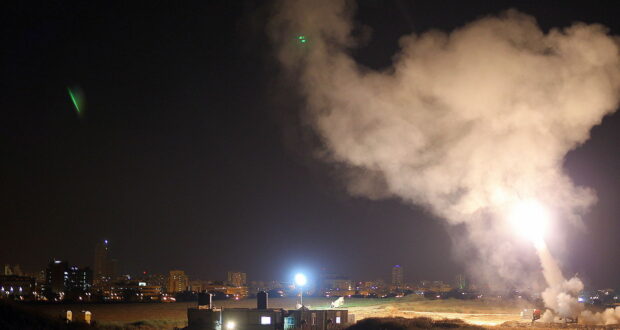By Raphael Levy
13th August 2014, Security and Defence, Issue 3, No. 5
Ceasefires between Israel and Hamas are always best described as uneasy. They are invariably broken almost instantly, often by rocket fire from any of the numerous terrorist organisations that operate within Gaza, though Israel is explicit in holding Hamas responsible for all rocket fire emanating from the territory. Unlike previous ceasefires that have been broken throughout Operation Protective Edge, this one is met with the withdrawal of Israeli troops to “defensive positions” with the stated objective of destroying Hamas’ tunnels being complete.[1]
There is much historical evidence to suggest, however, that this second attempt at a ceasefire in just a few days will be no different. Aside from anything else, it currently stands at (another) 72 hour ceasefire. Negotiations will have to occur before this can be extended with Hamas demands for a complete opening of the border crossings and ending of the blockade just two of the stumbling blocks to any permanent agreement. Given that 3000 rockets have been fired into Israel just in July[2] and Israel has discovered that tonnes of materials that could have been used for civilian purposes have gone to the construction of tunnels aimed at mass murder, this is not a demand Netanyahu and the Israeli government are going to consider.
Despite the odds and historical reasons to be sceptical, there is hope that a ceasefire can be brokered effectively as far as Israel is concerned. Whilst previous ceasefires have been opportunities for Hamas to rearm and replenish its stock of rockets, support for Hamas in the Arab world is dwindling. Whilst previous Egyptian governments were either actively supportive (Morsi’s Muslim Brotherhood) or saw Hamas as a legitimate Palestinian faction as Mubarak did, Sisi’s government is deeply resentful of the Muslim Brotherhood offshoot.[3] Add to this the fact that other Arab states, such as Jordan and Saudi Arabia, are also much more aligned with Israel when it comes to the views on Hamas, and Hamas’ position in the Arab than in previous conflicts.[4] This is the position from which it must negotiate the more permanent ceasefire. Talks to this effect are already underway.[5]
Whilst this remains in the realm of speculation, the dwindling of support that Hamas previously enjoyed is likely to force their hand in negotiations. Even Abbas has come out and asked Hamas what exactly they aim to achieve through rocket fire into Israel.[6] Any negotiations that take place, brokered by a resentful Egypt, are likely to suit Israel’s aims far more than they suit Hamas’. Whereas previous ceasefires are simply cloaked up rearming periods, this process is likely to be much more difficult this time around, not least because Sisi’s commitment to tight border control from the Egyptian side is stronger than Morsi’s ever was.
Indeed, Israel is much more confident in Sisi’s commitment to ensuring Hamas cannot rearm as effectively as it previously has. Israel’s withdrawal has not completely eradicated Hamas’ rocket stockpile nor has it dismantled Hamas, but with support from Sisi on border control neither of this is necessary.[7] Tight border controls from both Egypt and Israel would make rocket stockpiling almost impossible for Hamas and whilst they still have small numbers of rockets, these pose much less threat in smaller numbers – Hamas is at its most deadly when it sends multiple rockets into Israel at the same time to try and get past the Iron Dome system. It goes without saying that with fewer rockets, whilst it may be able to launch strikes against Israel, it is unable to use the best tactics it knows for bypassing Israel’s missile defence system.
Hamas has not been destroyed, but Israeli-Egyptian cooperation and dwindling support in the Arab world means that there is potential that this ceasefire will hold. For longer than previous ones anyway.
[1] http://www.bbc.co.uk/news/world-middle-east-28654229 [2] http://news.nationalpost.com/2014/08/02/hamas-will-pay-intolerable-price-for-continued-rocket-fire-on-israel-netanyahu-warns/ [3] http://www.jpost.com/Operation-Protective-Edge/Egypt-blames-Hamas-for-IDFs-ground-operation-363300 [4] http://www.nytimes.com/2014/07/31/world/middleeast/fighting-political-islam-arab-states-find-themselves-allied-with-israel.html?_r=0 [5] http://www.usatoday.com/story/news/world/2014/08/04/israel-hamas-gaza/13562587/ [6] http://www.ynetnews.com/articles/0,7340,L-4541732,00.html [7] http://www.thedailybeast.com/articles/2014/07/31/bibi-wants-hamas-to-stay.htmlRaphael Levy is a Research Assistant with the Human Security Centre
Contactable at Raphael.levy@hscentre.org
Please cite this article as:
Levy, R (2014) ‘Israel-Gaza, an uneasy truce’ Human Security Centre, Security and Defence, Issue 3, No. 5.
Image source: Israeli Defence Force via CC BY 2.0
 Human Security Centre Human Rights and International Security Research
Human Security Centre Human Rights and International Security Research




